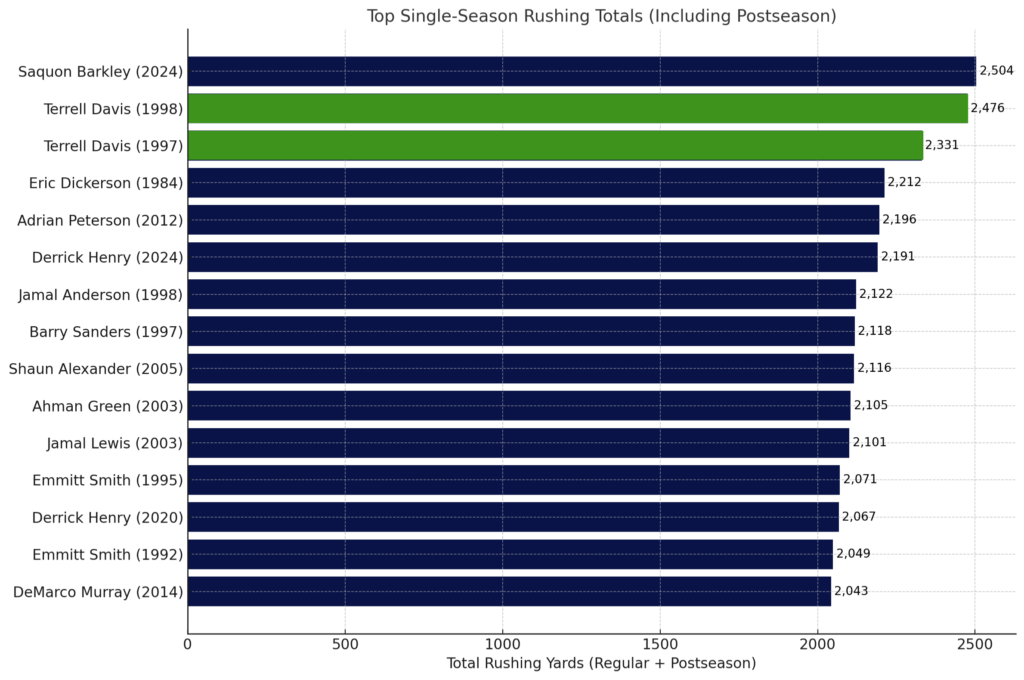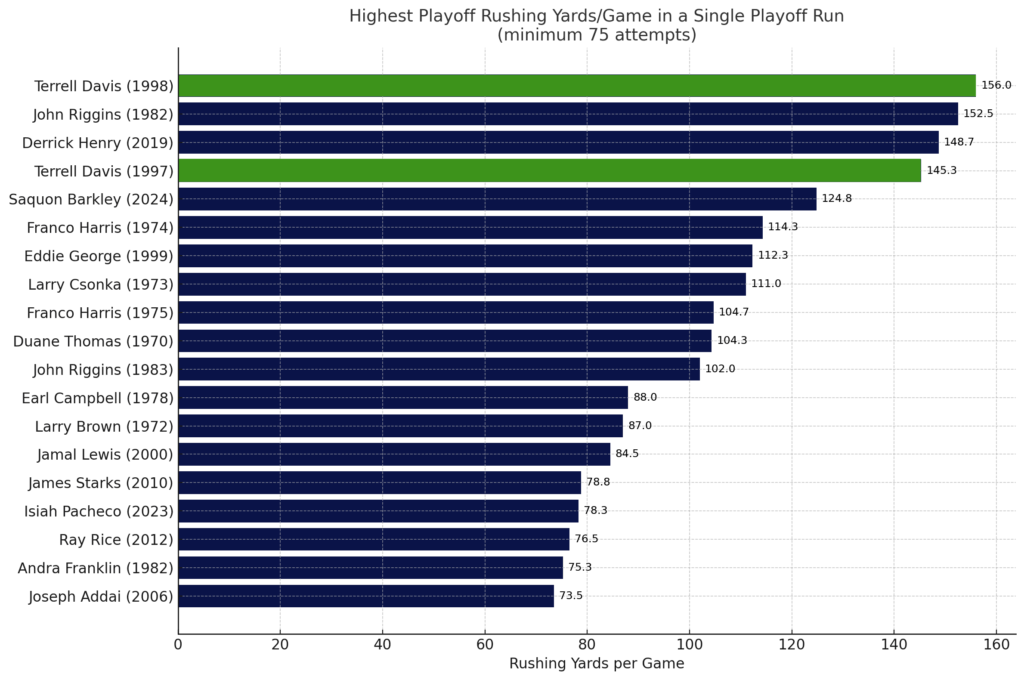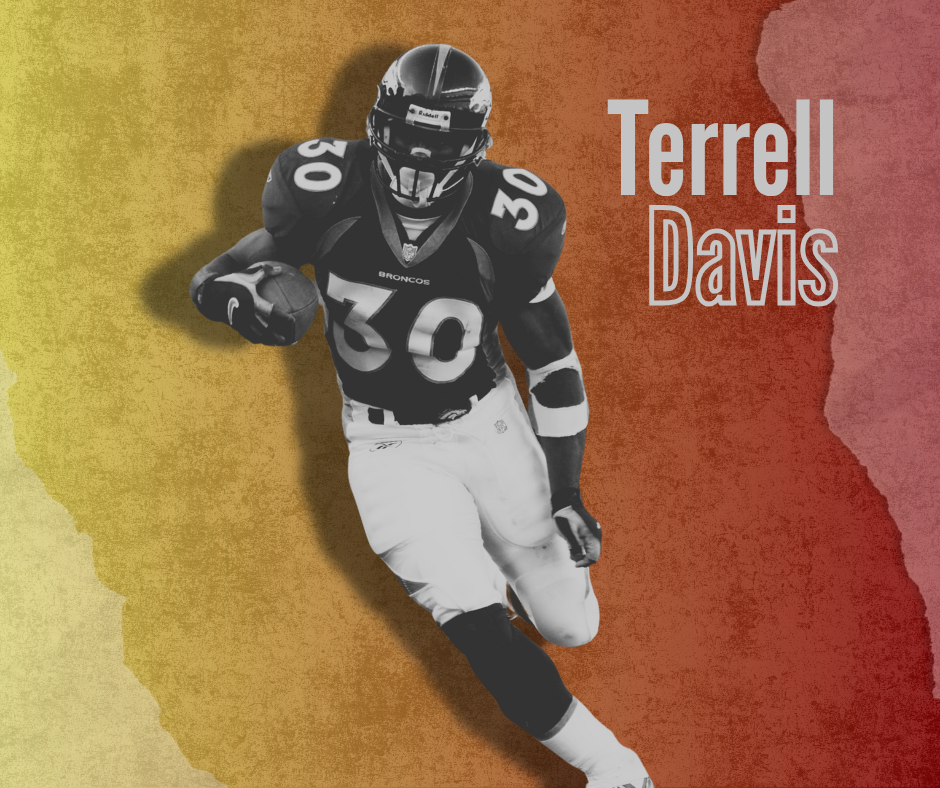In 1997, Terrell Davis was playing the best football of his life. A product of Long Beach State and the University of Georgia, Davis was in his third NFL season and delivering the most dominant stretch of his career. After a breakout 1996 campaign with over 1,500 rushing yards, Davis somehow took it up a notch.
He finished the 1997 regular season with more than 1,700 rushing yards and 15 touchdowns, ranking top two in both categories. Add 300 receiving yards and Davis ended the year with 2,037 yards from scrimmage. He was not just the engine of the Broncos’ offense, he was the entire vehicle. Denver went 12-4 and earned a Wild Card berth, thanks in large part to Davis.
And he did not slow down once the postseason began.
In the Wild Card round, Davis torched the Jaguars for 184 yards and two touchdowns on 31 carries. The next week in Kansas City, he ran for 101 yards and scored both of the Broncos’ touchdowns in a 14-10 win. Then, in the AFC Championship Game against the Steelers, Davis delivered 139 yards and another touchdown to push Denver into Super Bowl 32.
Even if he had never played in that Super Bowl, Davis would have had one of the most statistically dominant playoff runs ever. But he did play, and he was brilliant. Against the heavily favored Packers and an up-and-down performance from John Elway, Davis delivered again: 157 rushing yards, three touchdowns, and the game-winner with two minutes to go. He set a Super Bowl record for rushing touchdowns and was named MVP.
If you extended Davis’ playoff stats from that four-game run across a full season, he would have finished with over 2,300 rushing yards and 32 touchdowns. He became just the second player ever, after John Riggins, to rush for 100 yards in four playoff games in one postseason. Combining regular and postseason, Davis tallied over 2,300 rushing yards and 23 touchdowns in 1997.
For most players, that would be the peak of a career. For Terrell Davis, it was only the beginning.
In 1998, he outdid himself. Davis ran for 2,008 yards, becoming just the fourth player in NFL history at the time to cross the 2,000-yard threshold. He led the league in rushing touchdowns (21), yards per attempt, and yards per game. The accolades followed: MVP, Offensive Player of the Year (again), All-Pro honors, and another Super Bowl berth.
The Broncos went 14-2 and secured home field advantage. In the Divisional Round, Davis ran for 199 yards and two touchdowns against the Dolphins, averaging 9.5 yards per carry. In the AFC title game, he added 167 yards and a touchdown to push Denver into Super Bowl 33.
That final Super Bowl appearance wasn’t his flashiest. Davis rushed for 102 yards and added 50 receiving yards, but it marked the only playoff game of his career where he did not score a touchdown. Still, the Broncos defeated the Falcons 34-19 to win back-to-back titles, and Davis cemented his legacy.
Over 38 games from August 1997 through January 1999, Davis rushed for 4,807 yards and scored 46 touchdowns. He touched the ball 1,030 times across those two seasons. Only Derrick Henry, O.J. Simpson, and Eric Dickerson have ever rushed for as much as 4,500 yards in a 38-game stretch. Davis leads them all.

Even in the playoffs alone, his run was unprecedented. Over seven playoff games from 1997 to 1998, Davis ran for 1,049 yards and scored 12 touchdowns. He rushed for at least 100 yards in all seven games. According to Stathead, only John Riggins and Thurman Thomas have more than three consecutive playoff games with 100 rushing yards. Davis went seven for seven.

And yet, after Super Bowl 33, it all ended quickly. Davis never rushed for more than 750 yards in a season again. Knee injuries derailed his career, and after several surgeries and years of rehab, he officially retired in 2002. He gave Broncos fans one final Mile High Salute during a preseason game, then changed out of uniform for good.
In total, Davis finished his career with fewer rushing yards than Ezekiel Elliott, DeAngelo Williams, and Mark Ingram. But no one questioned his Hall of Fame credentials. The briefness of his peak did not matter. Voters remembered what they had seen.
During a 16-month span, Terrell Davis was the best football player on Earth. In the regular season. In the playoffs. In the Super Bowl. He dominated every level of competition and delivered for his team every time they needed him.
It was short-lived. But it was unforgettable. And it was more than enough to make him a legend.
Want more like this? Come hang with us here:
Instagram: @EnterSandmanSports
Facebook: @EnterSandmanSports
X (Twitter): @_SandmanSports
YouTube: @EnterSandmanSports
TikTok: @EnterSandmanSports
📨 Join our newsletter for weekly updates and picks!





1 Comment
by Jeffery
Thanks to my father who informed me about this
webpage, this webpage is genuinely awesome.
Comments are closed.